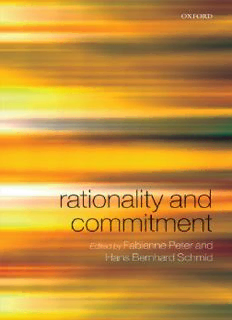Table Of ContentRationality and Commitment
This page intentionally left blank
Rationality and
Commitment
Edited by
Fabienne Peter and Hans Bernhard Schmid
OXFORD UNIVERSITY PRESS · OXFORD
1
GreatClarendonStreet,Oxfordox26dp
OxfordUniversityPressisadepartmentoftheUniversityofOxford.
ItfurtherstheUniversity’sobjectiveofexcellenceinresearch,scholarship,
andeducationbypublishingworldwidein
Oxford NewYork
Auckland CapeTown DaresSalaam HongKong Karachi
KualaLumpur Madrid Melbourne MexicoCity Nairobi
NewDelhi Shanghai Taipei Toronto
Withofficesin
Argentina Austria Brazil Chile CzechRepublic France Greece
Guatemala Hungary Italy Japan Poland Portugal Singapore
SouthKorea Switzerland Thailand Turkey Ukraine Vietnam
OxfordisaregisteredtrademarkofOxfordUniversityPress
intheUKandincertainothercountries
PublishedintheUnitedStates
byOxfordUniversityPressInc.,NewYork
FabiennePeterandHansBernhardSchmid,2007
Themoralrightsoftheauthorshavebeenasserted
DatabaserightOxfordUniversityPress(maker)
Firstpublished2007
Allrightsreserved.Nopartofthispublicationmaybereproduced,
storedinaretrievalsystem,ortransmitted,inanyformorbyanymeans,
withoutthepriorpermissioninwritingofOxfordUniversityPress,
orasexpresslypermittedbylaw,orundertermsagreedwiththeappropriate
reprographicsrightsorganization.Enquiriesconcerningreproduction
outsidethescopeoftheaboveshouldbesenttotheRightsDepartment,
OxfordUniversityPress,attheaddressabove
Youmustnotcirculatethisbookinanyotherbindingorcover
andyoumustimposethesameconditiononanyacquirer
BritishLibraryCataloguinginPublicationData
Dataavailable
LibraryofCongressCataloginginPublicationData
Dataavailable
TypesetbyLaserwordsPrivateLimited,Chennai,India
PrintedinGreatBritain
onacid-freepaperby
BiddlesLtd.,King’sLynn,Norfolk
ISBN978–0–19–928726–0
10 9 8 7 6 5 4 3 2 1
Contents
List of Figures, Schemata, and Tables vii
List of Contributors ix
Acknowledgments xii
Introduction 1
Rational Fools, Rational Commitments 3
FabiennePeter and Hans Bernhard Schmid
Part I. Committed Action 15
1. Why Exactly is Commitment Important for Rationality? 17
Amartya Sen
2. Construing Sen on Commitment 28
Philip Pettit
3. Sympathy, Commitment, and Preference 49
Daniel M. Hausman
Part II. Rethinking Rationality 71
4. Instrumental Rationality versus Practical Reason: Desires,
Ends, and Commitment 73
Herlinde Pauer-Studer
5. The Grammar of Rationality 105
Geoffrey Brennan
6. The Rationality of Rational Fools: The Role of
Commitments, Persons, and Agents in Rational Choice
Modelling 124
Werner Gu¨th and Hartmut Kliemt
7. Rational Self-Commitment 150
Bruno Verbeek
vi contents
8. Rationality and Commitment in Voluntary Cooperation:
Insights from Experimental Economics 175
Simon Ga¨chter and Christian Tho¨ni
Part III. Commitment, Intentions, and Identity 209
9. Beyond Self-Goal Choice: Amartya Sen’s Analysis of the
Structure of Commitment and the Role of Shared Desires 211
HansBernhard Schmid
10. Cooperation and the We-Perspective 227
Raimo Tuomela
11. Collective Intentions, Commitment, and Collective Action
Problems 258
Margaret Gilbert
12. Theories of Team Agency 280
Natalie Gold and Robert Sugden
13. Identity and Commitment: Sen’s Fourth Aspect of the Self 313
John B. Davis
Comment 337
Rational Choice: Discipline, Brand Name, and Substance 339
Amartya Sen
Index 363
List of Figures, Schemata, and Tables
Figures
3.1 Prisoner’sDilemma;gameform 63
3.2 Prisoner’sDilemma;game 63
3.3 Prisoner’sDilemma;gameform 68
6.1 Thesimpletrustgame 128
6.2 Relativeandabsolutecommitments 130
6.3 Takeitorleaveitinstrategicform 130
6.4 Takeitorleaveitinextensiveform 131
6.5 Modifiedtakeitorleaveitgame 131
6.6 Anembeddedbattleofthesexes 134
6.7 SequentialPrisoner’sDilemma 137
6.8 StrategicformofsequentialPrisoner’sDilemma 137
6.9 StandardPrisoner’sDilemmawithpowerto 138
committostrategiesasprogrammes
7.1 Decisiontree 164
8.1 ThePrisoner’sDilemmagame 176
8.2 Averagecontributionfunctionoftypes 186
freerider,conditionalcooperator,triangle
contributor,and‘others’
8.3 Averageactualcontributionsandpredicted 191
contributions
8.4 Averagecontributionsovertenperiods 193
8.5 Cooperationpatternsintheabsenceand 196
presenceofpunishment
10.1 Collectivegooddilemma 242
10.2 Prisoner’sDilemma 243
12.1 ThePrisoner’sDilemma 281
12.2 Hi-Lo 283
12.3 APrisoner’sDilemmawithtransformedpayoffs 293
12.4 Hawk–Dove 305
viii list of figures, schemata, and tables
Schemata
12.1 Individualrationality 286
12.2 Collectiverationality 287
12.3 Simpleteamreasoning(fromagroupviewpoint) 288
12.4 Simpleteamreasoning(fromanindividual 289
viewpoint)
12.5 Restrictedteamreasoning 295
12.6 Circumspectteamreasoning 297
12.7 Mutuallyassuredteamreasoning 303
Tables
6.1 Rationalchoiceasmaximizationand 144
non-maximization
8.1 Overviewofthedistributionoftypesin 188
Prisoner’sDilemmagamesandPublicGoods
games
List of Contributors
Geoffrey Brennan is Professor of Social and Political Theory in the Research
SchoolofSocialSciencesattheAustralianNationalUniversityandholdsaregular
visitingprofessorshipjointlyatUNC-ChapelHill(inthePhilosophyDepartment)
and Duke University (in the Political Science Department). He is author with
Nobel Laureate James Buchanan of The Reason of Rules (1985) and The Power
to Tax (1980) and most recently of The Economy of Esteem (2004) with Philip
Pettit.
John B.Davis is Professor of History and Philosophy of Economics at the
University of Amsterdam and Professor of Economics at Marquette Universi-
ty. He is author of Keynes’s Philosophical Development (1994) and The Theory
of the Individual in Economics (2003), is the former editor of the Review of
Social Economy, and currently co-editor of the Journal of Economic Methodolo-
gy.
Simon Ga¨chterisProfessor ofthe PsychologyofEconomicDecision Makingat
the School of Economics of the University of Nottingham (UK). His research is
in the area of behavioral and experimental economics. His main publications are
inNature,AmericanEconomicReview,andEconometrica.
MargaretGilbertholdstheMeldenChairinMoralPhilosophyattheUniversity
of California, Irvine. Her books include On Social Facts (1989), Living Together:
Rationality,Sociality,andCommitment(1996),SocialityandResponsibility:NewEssays
in Plural Subject Theory (2000), and A Theory of Political Obligation: Membership,
Commitment,andtheBondsofSociety(2006).
Natalie Gold is a Lecturer in Philosophy at the University of Edinburgh. She
investigatesindividualandcollectivedecision-makingusingmethodsfromavariety
ofdisciplines,includingeconomics,philosophy,andpsychology.Inparticularshe
isinterested in the incorporationof developmentsin cognitivescienceinto social
scientifictheories.
WernerGu¨thiscurrentlyDirectoroftheStrategicInteractionGroupattheMax
Planck Institute of Economics in Jena. He has published widely on a number of
subjects, including game theory, experimental economics, social psychology, and
philosophywhich form his mainresearch interests to the present day.Among his
Description:Rational choice theory forms the core of the economic approach to human behaviour. It is also the most influential philosophical account of practical rationality. Yet there are persistent controversies about the scope of rational choice theory in philosophy and, increasingly, in economics as well. A

